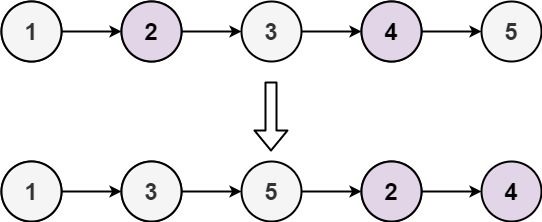Given the head of a singly linked list, group all the nodes with odd indices together followed by the nodes with even indices, and return the reordered list.
The first node is considered odd, and the second node is even, and so on.
Note that the relative order inside both the even and odd groups should remain as it was in the input.
Example 1:
Input: head = [1,2,3,4,5] Output: [1,3,5,2,4]
Example 2:
Input: head = [2,1,3,5,6,4,7] Output: [2,3,6,7,1,5,4]
Constraints:
- The number of nodes in the linked list is in the range
[0, 104]. -106 <= Node.val <= 106
Follow up: Could you solve it in
O(1) space complexity and O(nodes) time complexity?
# Definition for singly-linked list.
# class ListNode:
# def __init__(self, val=0, next=None):
# self.val = val
# self.next = next
class Solution:
def oddEvenList(self, head: ListNode) -> ListNode:
if head is None:
return head
evenHead = head.next
odd, even = head, evenHead
while even and even.next:
odd.next = even.next
odd = odd.next
even.next = odd.next
even = even.next
odd.next = evenHead
return head/**
* Definition for singly-linked list.
* public class ListNode {
* int val;
* ListNode next;
* ListNode() {}
* ListNode(int val) { this.val = val; }
* ListNode(int val, ListNode next) { this.val = val; this.next = next; }
* }
*/
class Solution {
public ListNode oddEvenList(ListNode head) {
if (head == null) {
return head;
}
ListNode evenHead = head.next;
ListNode odd = head, even = evenHead;
while (even != null && even.next != null) {
odd.next = even.next;
odd = odd.next;
even.next = odd.next;
even = even.next;
}
odd.next = evenHead;
return head;
}
}

